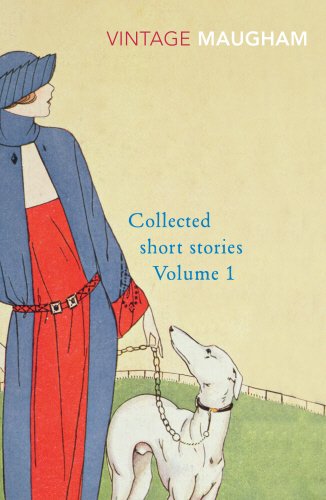
photo by Conor Lawless
by Mike Smith
A few nights ago I watched a couple of adaptations of W. Somerset Maugham short stories, produced by Gainsborough Films in the fifties. ‘The Facts of Life’ and ‘The Colonel’s Lady’, found in Maugham’s Collected Short Stories, form half of the four-part film Quartet.
An unexpected delight was to see Maugham himself – hair oiled back and gold teeth glinting in the black and white footage – introducing the films and telling us about his life and writing. There’s an air of incredible smugness about Maugham, and this seems to spread through to his characters.
This is particularly true of the protagonists in ‘The Facts of Life’, where an upper-middle class Nicky encounters a high-class tart in Monte Carlo. She’s twenty, he’s nineteen, though they both look middle-aged; he is in his gent’s formal attire, she in her evening gown. The voices too, and that of the narrator, have an elevated annunciation that brings Brian Sewell to mind.
 It is a good short story, though. Nicky’s father beefs to his fellow club members about how his son has gone to Monte Carlo, for the first time unaccompanied. He carries with him the fatherly advice not to gamble, not to lend money, and not to get involved with women. Nicky, of course, gambles, wins twenty thousand francs (it’s 100,000 in the film), lends a thousand (10,000 in the film), and lends it to a woman, whom he goes on to dine, dance and have sex with, at least in the short story version.
It is a good short story, though. Nicky’s father beefs to his fellow club members about how his son has gone to Monte Carlo, for the first time unaccompanied. He carries with him the fatherly advice not to gamble, not to lend money, and not to get involved with women. Nicky, of course, gambles, wins twenty thousand francs (it’s 100,000 in the film), lends a thousand (10,000 in the film), and lends it to a woman, whom he goes on to dine, dance and have sex with, at least in the short story version.
While Nicky seems to sleep, the woman raids his wallet and hides the money. But, having watched through half open eyes, Nicky returns the compliment, and retrieves it. In the morning they part and he subsequently discovers he has taken not only his money, but the rest of her stash too.
On his return, Nicky rubs his father’s nose in the bad advice. What should he do, the father asks his chums. Not to worry, old boy, they tell him, and the short story ends with the pithy comment that the boy is ‘lucky’, which is better than being ‘born clever or rich’.
What has always interested me in adaptations is the changes that are made from the originals. Some of these can be attributed to technological or financial limitations, but there are nearly always changes that cannot be easily explained away. These changes are made for other reasons, when the story is being put to another use, or where it is serving a new agenda. These changes often reveal the motives and nature of the film-makers, in stark contrast to those of the original writer. They also reveal something about the attitudes of the film-maker towards the audience and, perhaps, imply something about the audience itself. Such is the case here, I think, for the audience of Maugham’s original story was probably significantly different from that of the movie.
One baffling filmic change concerns the amounts of money Nicky wins and lends. In the film, those 100,000 francs are said to be worth one hundred pounds. In the book, the twenty thousand francs are worth ‘two hundred pounds roughly’. To me, the book’s exchange rate rings truer than that of the film, and it’s strange, I feel, that the film-maker should exaggerate the francs by such a multiplier – after all, the film was made only a short time after the story was published. So what does that tell us about the film’s target audience and their sense of money?
One other change that particularly grabbed my attention was that Nicky does not sleep with the woman in the film, and therefore is not told, as he leaves in the morning, that he is ‘a sweet boy and a wonderful lover’. In the film Nicky sleeps on the couch, although, before the lady retires to her bed, she does ask if there is ‘anything’ else that he wants.
When she comes out in the night to steal his money, we get an eyeful of her in her nightdress, but why were Gainsborough Films so coy about their night together, when Maugham himself was not? The answer must surely lie with what sort of audience the film was aimed at, and for what sort of readership the book was intended. Many of Maugham’s stories – though by no means all – were set in the ‘higher’ echelons of society. Attitudes towards money, and morality, were quite different to those in the penny seats of the picture house.
 The second film, ‘The Colonel’s Lady’ was set in similar class confines, but amongst an older generation. The eponymous heroine – a dowdy, middle-aged woman, married to a boring and rather comic, old buffer – has written a poetry book, without her husband’s knowledge. It chronicles a steamy romance with a younger man who has died, leaving behind only bittersweet memories.
The second film, ‘The Colonel’s Lady’ was set in similar class confines, but amongst an older generation. The eponymous heroine – a dowdy, middle-aged woman, married to a boring and rather comic, old buffer – has written a poetry book, without her husband’s knowledge. It chronicles a steamy romance with a younger man who has died, leaving behind only bittersweet memories.
Amazingly, the collection becomes the talk of the town and the husband’s club. And she, rather than he, gets invited to dine with the local aristocracy. He is bewildered, particularly when his mistress and associates rave about the collection.
The colonel is hurt, outraged too, believing that his dowdy wife must have had an affair. At the end his solicitor, who, like everyone else, has read the poems, advises him to let it go, to do nothing. After huffing and puffing, the colonel agrees that is the best way forward. But, as with all good short stories, the last few words are critical:
“The truth is, I don’t know what I’d do without Evie. But I’ll tell you what, there’s one thing I shall never understand till my dying day: What in the name of heaven did the fellow ever see in her?:
With this ending, Maugham leaves the reader to reflect on the colonel, his marriage and, by extension, on our own relationships and those around us. This is a tragi-comedy. However, the film-makers don’t appear to have had Maugham’s degree of faith in their audience; they bolted on a schmaltzy ending. The colonel demands to know who the bounder was and the wife explains that she has written about his younger self, from the days of their first love. The film ends with the colonel’s head pressed into her bossom.
Though it does deliver on ‘pity’ and the sentiments we might have gathered towards the colonel and his wife’s predicament, it is neatly tied up. It doesn’t allow the audience to reflect on what might have been.
Whether or not Maugham approved of the addition can only be speculated upon. Clues in the original text certainly suggest he would not have welcomed it, particularly the colonel’s attitude towards his wife: ‘Damn it all, even ten years ago Evie was no chicken and God knows, she wasn’t much to look at.’ The negatives are deep-rooted in the colonel and even his lawyer remarks, ‘after all, you’re not in love with her, are you?’ As far as I could see, there’s no hint that the colonel has grown out of love, it’s more likely that they have never been close. Yet, I suspect Maugham must have agreed to the addition. He was well enough known to have some say and does introduce the stories in person in the film. Perhaps they made him an offer he couldn’t refuse.
They have not necessarily damaged the story. What they have done, though, is to radically change its message. The film-makers, in that single extra scene, turned Somerset Maugham’s story completely around, stood it on its head. And the reason for doing so was, I’m sure, to serve a target audience that the original text was not seeking to serve. Films are so like short stories, in the importance invested in their endings. When the curtain closes and we leave the cinema, it is the endings that haunt us, just as we dwell on the closing paragraphs, sentences, or words at the end of a short story.

